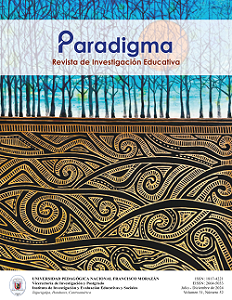Oral communication in the English subject: school trajectory narratives of students at a rural normal school
DOI:
https://doi.org/10.5377/paradigma.v31i52.19489Keywords:
communicative competence, higher education, oral expression, English, classroom policies, translanguagingAbstract
English learning consists of achieving four linguistic skills: reading, writing, listening, and speaking. The latter is one of the main motivations for learners to acquire the language, even though mastering this skill within formal schooling can be difficult. This study aims to describe and analyze the narratives of students at the Rural Normal School “Ricardo Flores Magón” regarding their academic trajectories in the English subject, specifically focusing on the oral communication skill. The research positions itself within the constructivist paradigm, utilizing an interpretative approach and a narrative-biographical methodology. It employs in-depth interviews with seven key informants. The analysis categories include the policies teachers implement in English classes regarding the use of students' first language and the strategies that learners employ in oral communication activities. The results emphasize that teachers should consider how they develop this linguistic skill, due to the emotional impact that certain teaching strategies have on students. As a proposal, the need to implement the translanguaging approach is highlighted.
Downloads
287
Downloads
Published
How to Cite
Issue
Section
License
Copyright (c) 2024 Universidad Pedagógica Nacional Francisco Morazán

This work is licensed under a Creative Commons Attribution-NonCommercial-NoDerivatives 4.0 International License.
Transfer of Copyright
- The author, when sending the work, states that it is his will to give the Universidad Pedagógica Nacional Francisco Morazán the patrimonial rights that correspond to him as the author of his work.
- The rights here assigned include all economic rights (Reproduction, transformation, public communication and distribution) and are given without limitation in terms of territory; This Assignment is given for the entire duration term established in the current legislation in Honduras.
- The cession of the aforementioned rights does not imply the cession of moral rights over it, because in accordance with the provisions of the Copyright and Related Rights Law, Chapter II, of the Moral Rights, Article 34, Article 25 , these rights are inalienable, imprescriptible, indefeasible and inalienable.
- The research work or document must be original and have been done without violating or usurping rights of third parties, therefore, the work is exclusively authored and owns the same.
- In the case of any claim or action by a third party, as to copyright on the work in question, the author must assume full responsibility for the rights assigned.
- Upon completion of the Rights Assignment Form, the author states that the work has not been published in another way, that the rights on the work have not been assigned and that no encumbrance or limitation on their use or use is imposed on them.





